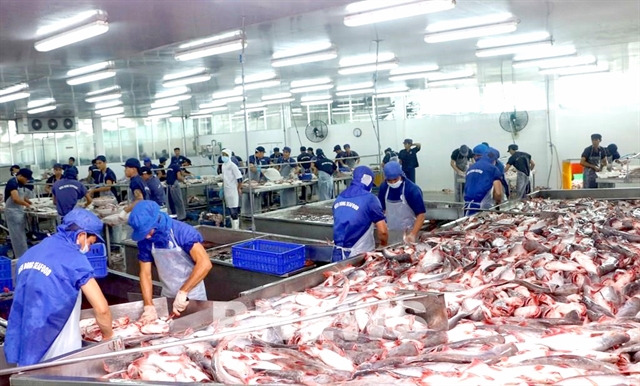 Economy
Economy

Seafood exports are expected to fetch US$2.1 billion in the second quarter, a year-on-year increase of 10 per cent, according to the Việt Nam Association of Seafood Exporters and Producers (VASEP).

|
| A pangasius processing plant in Cần Thơ. Seafood exports are expected to fetch US$2.1 billion in the second quarter, a year-on-year increase of 10 per cent. — VNA/VNS Phot Thanh Liêm |
HCM CITY — Seafood exports are expected to fetch US$2.1 billion in the second quarter, a year-on-year increase of 10 per cent, according to the Việt Nam Association of Seafood Exporters and Producers (VASEP).
With their agility in exploring and diversifying markets, enterprises would continue to expand exports, it said.
It forecast shrimp export to top $980 million in Q2, a year-on-year increase of 10 per cent, and pangasius and marine product exports to increase by 7 per cent and 9.6 per cent to $712 million and $816 million.
Seafood exports fell significantly in the first two months of the year due to a disruption in the supply chain, especially logistics, as a result of the Covid-19 pandemic.
But they recovered in March to rise to $2.39 billion in the first four months, an increase of 6 per cent from a year ago, as enterprises made efforts to adapt to the changes caused by the pandemic and capitalised on free trade agreements to push exports, the association said.
Trương Đình Hoè, VASEP's general secretary, said the EU-Việt Nam FTA had greatly boosted exports of seafood products to the EU.
The UK-Việt Nam FTA, which would take over when the EU-Việt Nam Free Trade Agreement expires for the UK, opened up opportunities for Vietnamese seafood firms to promote exports to a market that used to account for a third of its total shipments to the erstwhile bloc of 28 countries, he added.
Nguyễn Hoài Nam, VASEP deputy general secretary, said demand from major import markets such as the US, Japan and China would continue to increase.
The US market would continue to be a bright spot for many Vietnamese seafood products such as shrimp, pangasius and others, he said. Vietnamese exporters would have more opportunities to export to the US since India, the largest shrimp supplier to the market, was facing production difficulties due to the pandemic, he added.
Hồ Quốc Lực, chairman of Sao Ta Food JSC, said global demand for shrimp usually increased by 5 per cent a year whereas output in major producing countries would not increase this year.
"Shrimp prices might increase slightly this year. Việt Nam's shrimp exports might go up by 5-7 per cent."
Hoè said: "Covid-19 has changed consumption habits globally, with people eating at home more frequently and tending to eat more seafood products, especially shrimp. The trend is expected to continue for the next few years."
To further increase exports, the seafood sector must find ways to reduce costs to become competitive, he added.
Though there are good signs in the market, exports will still be affected by high transport and input costs, according to the association.
Besides, businesses must realise that the fight against Covid will continue to be an important task in 2021, and have plans to store raw materials.
In the context of high input costs in aquaculture, Trần Đình Luân, director of the General Department of Fisheries, said the seafood sector would continue to promote linkages in production to enable firms to get good quality of inputs at reasonable prices and enhance the use of technology to increase productivity, reduce costs and protect the environment. — VNS




